情态动词have_done
高一B2U1-2情态动词+have_done_结构

高一英语B2U1-2 情态动词+have+doneI.对过去的推测一、“must+have+done”表示对过去事情的肯定推测,译成“一定做过某事”,只用于肯定句。
It must have rained last night, for the ground is wet. 昨晚一定下雨了,因为地面还是湿的。
二、“can't+have+done”表示对过去事情的否定推测,译成“不可能做过某事”,只用于否定句。
Mr. Smith can't have gone to Beijing, for I saw him in the library just now.史密斯先生不可能去北京了,我刚才还在图书馆见过他。
三、“can+have+done”表示对过去行为的怀疑,用于疑问句,译成“可能做过……吗?”。
There is nowhere to find them. Where can they have gone?到处找不到他们,他们可能到什么地方去呢?四、“may+have+done”表示对发生过的事情的推测,是“可能已经”或“也许已经”,用于肯定句中。
—What has happened to George? —I don't know. He may have got lost.—乔治发生了什么事?—我不知道,他可能迷路了。
五、“might+have+done”表示对过去事情的推测,might与may意思相同,但可能性更小。
He might have given you more help, even though he was busy.他或许会多给你一些帮助,即使他很忙。
II.对过去事实进行相反的假设六、“could+have+done”是虚拟语气,表示对过去事情的假设,意思是本来能够做某事而没有做。
He could have passed the exam, but he was too careless. 本来他能够通过考试,但是他太粗心。
情态动词+have done的构成及用法含译文
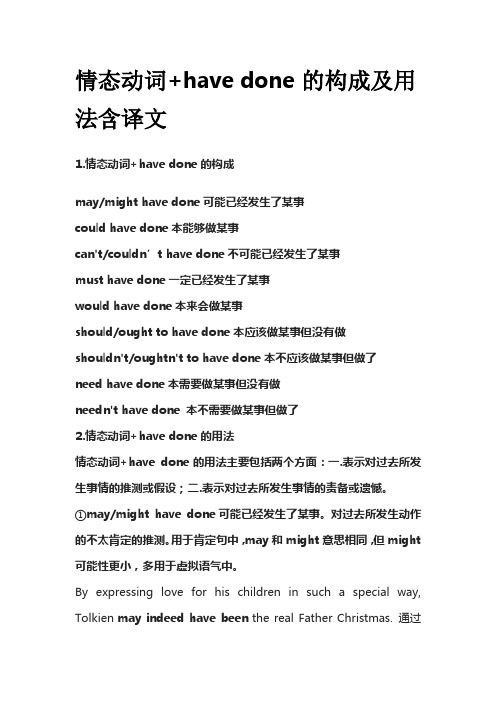
情态动词+have done的构成及用法含译文1.情态动词+have done的构成may/might have done可能已经发生了某事could have done本能够做某事can't/couldn’t have done不可能已经发生了某事must have done一定已经发生了某事would have done本来会做某事should/ought to have done本应该做某事但没有做shouldn't/oughtn't to have done本不应该做某事但做了need have done本需要做某事但没有做needn't have done 本不需要做某事但做了2.情态动词+have done的用法情态动词+have done的用法主要包括两个方面:一.表示对过去所发生事情的推测或假设;二.表示对过去所发生事情的责备或遗憾。
①may/might have done可能已经发生了某事。
对过去所发生动作的不太肯定的推测。
用于肯定句中,may和might意思相同,但might 可能性更小,多用于虚拟语气中。
By expressing love for his children in such a special way, Tolkien may indeed have been the real Father Christmas. 通过这种特别的方式表达对孩子们的爱,托尔金可能真的是真正的圣诞老人。
(新外研版必修二)You can check his office. He might have been there already. 你可以去他的办公室看看。
他可能已经到那儿了。
If he had been given more encouragement, he might have made greater progress. 如果给他更多的鼓励,他可能会取得更大的进步。
最新情态动词+have-done总结
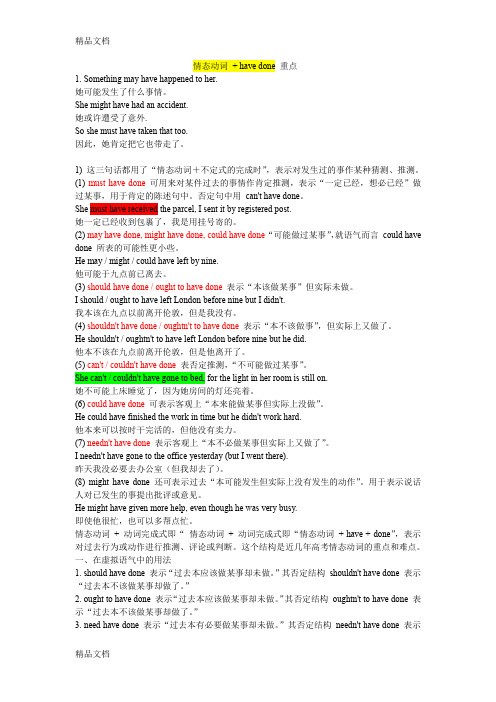
情态动词+ have done 重点1. Something may have happened to her.她可能发生了什么事情。
She might have had an accident.她或许遭受了意外.So she must have taken that too.因此,她肯定把它也带走了。
1) 这三句话都用了“情态动词+不定式的完成时”,表示对发生过的事作某种猜测、推测。
(1) must have done 可用来对某件过去的事情作肯定推测,表示“一定已经,想必已经”做过某事,用于肯定的陈述句中。
否定句中用can't have done。
She must have received the parcel, I sent it by registered post.她一定已经收到包裹了,我是用挂号寄的。
(2) may have done, might have done, could have done “可能做过某事”,就语气而言could have done 所表的可能性更小些。
He may / might / could have left by nine.他可能于九点前已离去。
(3) should have done / ought to have done表示“本该做某事”但实际未做。
I should / ought to have left London before nine but I didn't.我本该在九点以前离开伦敦,但是我没有。
(4) shouldn't have done / oughtn't to have done 表示“本不该做事”,但实际上又做了。
He shouldn't / oughtn't to have left London before nine but he did.他本不该在九点前离开伦敦,但是他离开了。
高考“情态动词+have_done”考点解析
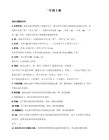
2、根据句意“我妹妹昨天在大剧院见过他”,所以,一定是对过去已经发生的否定的判断,答案选A。
3、本句表达的是对过去发生过的情况的疑问,所以应该用could have done,答案选C。
It must have rained last night, for the ground is wet this morning.
昨天晚上一定是下雨了,因为今晨地面是潮湿的。
She didn’t attend the lesson yesterday. She must have been ill.
A. should B. must C. could D. would
4. I didn’t see her in the meeting-room this morning. She ____ at the meeting. (1995 上海)
A. mustn’t have spoken B. shouldn’t have spoken
A. might B. should C. can D. will
2. The window was broken. Tom ____ have done that, for he was a little naughty.
A. could B. might C. should D. ought to
--- It ___ a comfortable journey. (MET95)
A. can’t be B. shouldn’t be C. mustn’t have been D. couldn’t have been
2. My sister met him at the Grand Theatre yesterday, so he ____ your lecture. (2002 上海)
情态动词+have done

情态动词+have done 表示一种悔恨、可惜、惋惜等等。
1. But scientists may have found a way to help with this trouble.•情态动词+have+done1)must+have+done肯定/一定做过某事(肯定推测)•It must have rained last night, because the ground is wet.•You must have been mad to speak to Colin.【翻译】何红宇肯定已经去打篮球了。
因为班上的篮球不在了。
2)can‟t+have+done不可能做过某事(肯定推测)•Mr. Smith can't have gone to Beijing because I saw him in the library just now.•Mary can't have stolen your money. She’s not that type of person.【翻译】徐子凌昨天不可能借钱给你,因为她知道你从来都有借不还。
3)can+have+done?可能做过……吗?(表示推测可能性)•Where can they have gone?【翻译】谁有可能刚才偷了我的自行车呢?我仅仅去取了100块钱而已。
取钱:withdraw 4)may+have+done可能已经做(而实际未做)may not +have+done可能没有做(而实际上做了)• —What has happened to George?• —I don't know. He may have gotten lost.【翻译】谢永其老师昨天可能生病了。
他昨天一天都没有在学校。
5)might+have+done 本可能已经做了(而实际上未做)might not+have+done 本可能没有做(而实际上做了)提示:might与may意思相同,但可能性更小。
【VIP专享】情态动词+have-done的用法
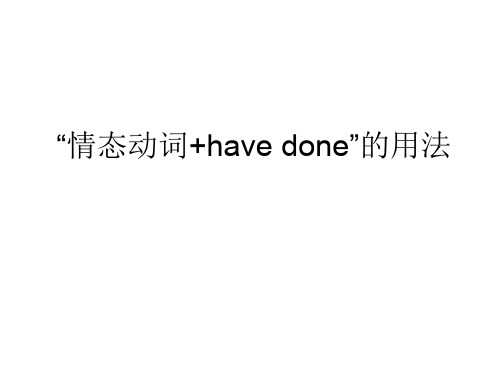
一,“must+have+done”
表示对过去事情的肯定推测,译成“一定做 过某事”,该结构只用肯于定_____句。 1. It must have rained last night, for the ground is wet.
昨晚一定下雨了,因为地面还是湿的。
• I needn‘t have bought so much wine—only five people came.
•我本来没有必要买这么多酒,只来了五个人。
• He need have hurried to the station. In that case, be wouldn't have missed the train.
2.You must have been mad to speak to the servant.
你和仆人说话,一定是发疯了。
二,“can't+have+done”
• 表示对过去事情的否定推测,译成“不可 能做过某事”。
• 1. Mr. Smith can‘t have gone to Beijing, for I saw him in the library just now.
• 2. Without your help, I wouldn't have achieved so much.
没有你的帮助,我是不会取得如此大的成绩。
十、“need+have+done”
• 表示本来需要做某事而没有做。 “needn‘t+have+done”则表示“本来不需 要做某事而做了”。
• 1. Tom, you are too lazy. The work should have been finished yesterday.
情态动词+have-done用法
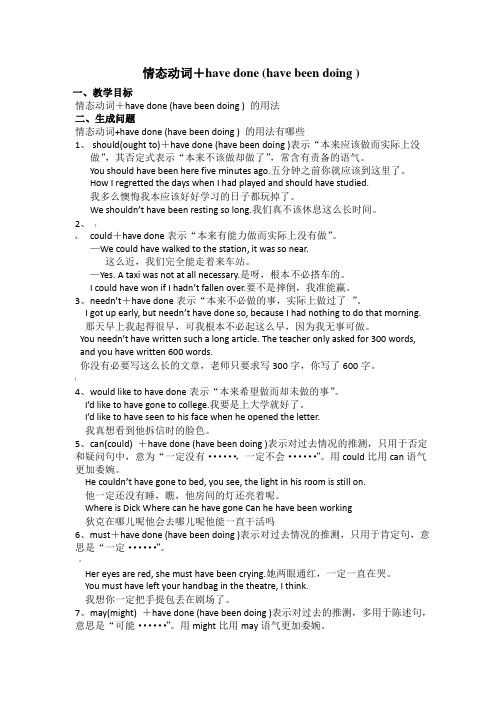
情态动词+have done (have been doing )一、教学目标情态动词+have done (have been doing ) 的用法二、生成问题情态动词+have done (have been doing ) 的用法有哪些1、should(ought to)+have done (have been doing )表示“本来应该做而实际上没做”,其否定式表示“本来不该做却做了”,常含有责备的语气。
You should have been here five minutes ago.五分钟之前你就应该到这里了。
How I regretted the days when I had played and should have studied.我多么懊悔我本应该好好学习的日子都玩掉了。
We shouldn’t have been resting so long.我们真不该休息这么长时间。
2、《3、could+have done表示“本来有能力做而实际上没有做”。
—We could have walked to the station, it was so near.这么近,我们完全能走着来车站。
—Yes. A taxi was not at all necessary.是呀,根本不必搭车的。
I could have won if I hadn’t fallen over.要不是摔倒,我准能赢。
3、needn’t+have done表示“本来不必做的事,实际上做过了”。
I got up early, but needn’t have done so, because I had nothing to do that morning.那天早上我起得很早,可我根本不必起这么早,因为我无事可做。
You needn’t have written such a long article. The teacher only asked for 300 words, and you have written 600 words.你没有必要写这么长的文章,老师只要求写300字,你写了600字。
“情态动词have-done”重点讲解

03
have-done的句型结构
have done句型
表示现在完成时,强调动作已经完成 但对现在有影响。
时态:现在时间点之前完成的动作。
用法:have done + 过去分词,例如: I have finished my homework.
had done句型
表示过去完成时,强调动作在过 去的某个时间之前已经完成。
定义
表示过去的某个时间点,某个动作已经完成或发生 的动作。
表示过去的某个时间点,某个动作已经完成或发生 的动作,并且强调这个动作对现在的影响。
表示过去的某个时间点,某个动作已经完成或发生 ,并且强调这个动作对未来的影响。
用法分类
02
01
03
表示过去的某个时间点,某个动作已经完成或发生, 并且强调这个动作对现在的影响。
3. I _____ (see) the film twice, so I don't want to see it again. (用适当的形式填空)
答案:have been working 答案:has finished 答案:have seen
翻译题练习
1. 我已经完成了我的论文,现
在可以放松一下了。
时态:将来时间点之前完成的动作。
04
have-done的语境与语义
表示经验
用于描述个人或团体过去所经历的事件或状态,强调经验或经历 。
例如:I have been to the Great Wall before. (我之前去过长城 。)
表示结果
01
强调某个动作或行为所产生的结 果或影响。
02
A. has taken B. has lifted C. has been taking D. has been lifting
情态动词+have-done的用法
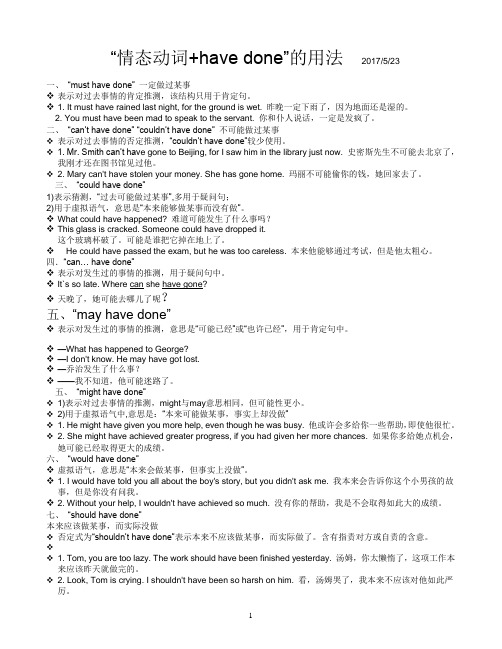
“情态动词+have done”的用法2017/5/23一、“must have done” 一定做过某事表示对过去事情的肯定推测,该结构只用于肯定句。
1. It must have rained last night, for the ground is wet. 昨晚一定下雨了,因为地面还是湿的。
2. You must have been mad to speak to the servant. 你和仆人说话,一定是发疯了。
二、“can’t have done” “couldn’t have done” 不可能做过某事表示对过去事情的否定推测,“couldn’t have done”较少使用。
1. Mr. Smith can’t have gone to Beijing, for I saw him in the library just now. 史密斯先生不可能去北京了,我刚才还在图书馆见过他。
2. Mary can't have stolen your money. She has gone home. 玛丽不可能偷你的钱,她回家去了。
三、“could have done”1)表示猜测,“过去可能做过某事”,多用于疑问句;2)用于虚拟语气,意思是“本来能够做某事而没有做”。
What could have happened? 难道可能发生了什么事吗?This glass is cracked. Someone could have dropped it.这个玻璃杯破了。
可能是谁把它掉在地上了。
He could have passed the exam, but he was too careless. 本来他能够通过考试,但是他太粗心。
四.“can… have done”表示对发生过的事情的推测,用于疑问句中。
It`s so late. Where can she have gone?天晚了,她可能去哪儿了呢?五、“may have done”表示对发生过的事情的推测,意思是“可能已经”或“也许已经”,用于肯定句中。
情态动词+have_done_结构
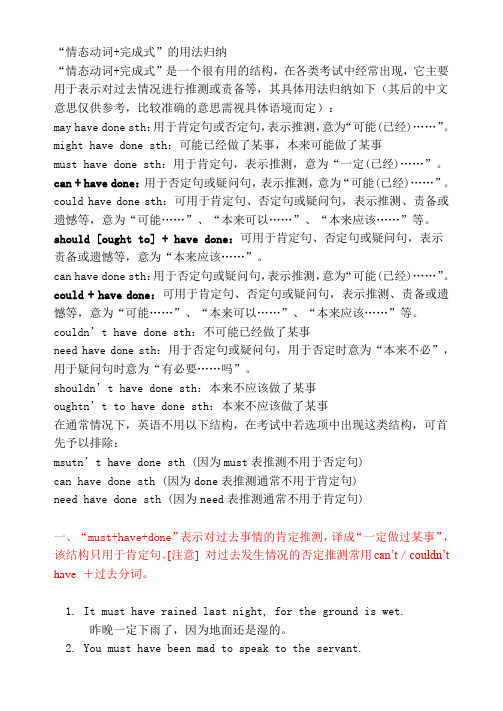
“情态动词+完成式”的用法归纳“情态动词+完成式”是一个很有用的结构,在各类考试中经常出现,它主要用于表示对过去情况进行推测或责备等,其具体用法归纳如下(其后的中文意思仅供参考,比较准确的意思需视具体语境而定):may have done sth:用于肯定句或否定句,表示推测,意为“可能(已经)……”。
might have done sth:可能已经做了某事,本来可能做了某事must have done sth:用于肯定句,表示推测,意为“一定(已经)……”。
can + have done:用于否定句或疑问句,表示推测,意为“可能(已经)……”。
could have done sth:可用于肯定句、否定句或疑问句,表示推测、责备或遗憾等,意为“可能……”、“本来可以……”、“本来应该……”等。
should [ought to] + have done:可用于肯定句、否定句或疑问句,表示责备或遗憾等,意为“本来应该……”。
can have done sth:用于否定句或疑问句,表示推测,意为“可能(已经)……”。
could + have done:可用于肯定句、否定句或疑问句,表示推测、责备或遗憾等,意为“可能……”、“本来可以……”、“本来应该……”等。
couldn’t have done sth:不可能已经做了某事need have done sth:用于否定句或疑问句,用于否定时意为“本来不必”,用于疑问句时意为“有必要……吗”。
shouldn’t have done sth:本来不应该做了某事oughtn’t to have done sth:本来不应该做了某事在通常情况下,英语不用以下结构,在考试中若选项中出现这类结构,可首先予以排除:msutn’t have done sth (因为must表推测不用于否定句)can have done sth (因为done表推测通常不用于肯定句)need have done sth (因为need表推测通常不用于肯定句)一、“must+have+done”表示对过去事情的肯定推测,译成“一定做过某事”,该结构只用于肯定句。
高中-虚拟语气——情态动词+have-done用法、练习和答案

情态动词+have done用法及练习1.must have done 表示对过去或已经发生的行为或状态进行确有把握的推测,意为“肯定做了某事”;只能用在陈述句的肯定句中。
It must have rained last night, for the road is wet.The lights were out. They must have been asleep.2.can’t/couldn’t have done sth.表示对过去或已经发生的行为或状态进行确有把的推意为“不可能做了某事”;只能用在陈述句的否定句中。
He was with me last night. He can’t/ couldn’t have gone to the theatre.I saw Mr. Wang just now. He couldn’t have gone to Beijing.Can/Could …have done sth?表示对过去或已经发生的行为或状态的怀疑.意为“可能已经…吗?”。
用在疑问句中。
He didn’t attend his sister’s birthd ay party. Can/Could he have forgotten it?3.could have done sth.用于陈述句的肯定句中时是虚拟语气,表示没有实现的可能性,意为“本来可以做,可能已经做”。
有一种对过去为付诸实施的事情的惋惜。
用于肯定句中You could have done better, but you were too careless.3.may/might(not)have done sth表示对过去或已经发生的行为或状态进行推测意为“可能(没有)做了某事;只能用在陈述句的肯定和否定句中。
It’s too late. I think he may have gone to bed. He might not have finished the work.5.Should/ought to have done sth表示“本应该做…”而实际上没做Should/ought not to have done sth. 表示“本不应该做”而实际上做了You should have come to the meeting earlier. You ought to have done this exercise .You shouldn’t have told her the truth. He ought not to have treated his parents like that.6.needn’t have done sth.表示做了“本来不必做的事didn’t need to do 表示“没有必要做而实际上也没有做的事“You needn’t have taken a taxi here, for it was very ne ar to my house.I didn’t need to clean the windows. My brother did it.7.had better have done sth.用于事后的建议,含轻微的责备的口吻,意为“当时最好做了某事“,其否定形式had better not have done sth 表达相反的含义。
情态动词+have-done的用法

2. — I’m sorry. I ______ at you the other day. — Forget it. I was a bit out of control myself. (2008 江苏) A. shouldn’t shout B. shouldn’t have shouted C. mustn’t shout D. mustn’t have shouted
• 2. Without your help, I wouldn't have achieved so much.
没有你的帮助,我是不会取得如此大的成绩。
十、“need+have+done”
• 表示本来需要做某事而没有做。 “needn„t+have+done”则表示“本来不需 要做某事而做了”。 • I needn„t have bought so much wine—only five people came.
5. He did not regret saying what he did but felt that he _____ it differently. (2009 江苏) A. could express B. would express C. could have expressed D. must have expressed
•屋里没有灯,他们可能出去了吗?
• 2. There is nowhere to find them. Where can they have gone?
•到处找不到他们,他们可能到什么地方去呢?
四、“could+have+done”
• 是虚拟语气,表示对过去事情的假设,意思是 本来能够做某事而没有做, “本来可以” 。 • He could have passed the exam, but he was too careless.
- 1、下载文档前请自行甄别文档内容的完整性,平台不提供额外的编辑、内容补充、找答案等附加服务。
- 2、"仅部分预览"的文档,不可在线预览部分如存在完整性等问题,可反馈申请退款(可完整预览的文档不适用该条件!)。
- 3、如文档侵犯您的权益,请联系客服反馈,我们会尽快为您处理(人工客服工作时间:9:00-18:30)。
情态动词+have+done是历年高考的重点和难点之一,现将其用法总结归纳如下:一、must+have+done表示对过去事情的肯定推测,译成“一定做过某事”,该结构只用于肯定句.1. It must have rained last night, for the ground is wet. 昨晚一定下雨了,因为地面还是湿的2. You must have been mad to speak to the servant.你和仆人说话,一定是发疯了二、“can't+have+done”表示对过去事情的否定推测,译成“不可能做过某事”。
1. Mr. Smith can't have gone to Beijing, for I saw him in the library just now. 史密斯先生不可能去北京了,我刚才还在图书馆见过他。
2.Mary can't have stolen your money. She has gone home.玛丽不可能偷你的钱,她回家去了三、“can+have+done”表示对过去行为的怀疑,用于疑问句,译成“可能做过……吗?”。
1.There is no light in the room. Can they have gone out?屋里没有灯,他们可能出去了吗?2. There is nowhere to find them. Where can they have gone? 到处找不到他们,他们可能到什么地方去呢?四、could+have+done’是虚拟语气,表示对过去事情的假设,意思是本来能够做某事而没有做.He could have passed the exam, but he was too careless.本来他能通过考试,但他太粗心五、“may+have+done”表示对发生过的事情的推测,意思是“可能已经”或“也许已经”,用于肯定句中。
—What has happened to George?—I don't know. He may have got lost.—乔治发生了什么事?—我不知道,他可能迷路了。
六、“might+have+done”表示对过去事情的推测,might 与may意思相同,但可能性更小。
多用于虚拟语气结构中。
1. He might have given you more help, even though he was busy. (MET90) 他或许会多给你一些帮助,即使他很忙。
2. She might have achieved greater progress, if you had given her more chances. 如果你多给她点机会,她可能已经取得更大的成绩。
七、“would+have+done”虚拟语气,表示对过去事情的假设,意思是“本来会做”。
1. I would have told you all about the boy's story, but you didn't ask me. 我本来会告诉你这个小男孩的故事,但是你没有问我。
2. Without your help, I wouldn't have achieved so much. 没有你的帮助,我是不会取得如此大的成绩。
八、“should+have+done”意思是“本来应该做某事,而实际没做。
” “shouldn't+have+done”表示本来不应该做某事,而实际做了.含有指责对方或自责的含意1. Tom, you are too lazy. The work should have been finished yesterday. 汤姆,你太懒惰了,这项工作本来应该昨天就做完的。
2. Look, Tom is crying. I shouldn't have been so harsh on him. 看,汤姆哭了,我本来不应该对他如此严厉。
九、“ought to+have+done”表示过去应该做而实际并没有做,译成“理应做……”,往往表示遗憾。
与“should+have+done”用法基本一样。
I ought to have gone home last Sunday.我理应上星期日回家。
You ought not to have given him more help.你不应该帮助他那么多。
十、“need+have+done”表示本来需要做某事而没有做。
“needn't+have+done”则表示“本来不需要做某事而做了”。
I needn't have bought so much wine—only five people came. 我本来没有必要买这么多酒,只来了五个人。
He need have hurried to the station. In that case, be wouldn't have missed the train. 他本来需要快点去车站,那样的话,他就不会误了火车。
“情态动词+have done”表示对过去情况的推测或估计,是历年高考的热点。
1.should (ought to) have+过去分词表示过去应该做而(实际)没有做的事情,含有责备或遗憾的语气,意为“本应该……”;其否定形式为“should not /ought not to have+过去分词”,表示某种行为不该发生但却发生了。
Mr. White _____ at 8:30 for the meeting , but he didn’t’ show up.(04’广西卷)A.should have arrivedB.should arriveC.should have had arrivedD.should be arriving[解析]本题中的一个关键词but暗示了“Mr. White按道理理应到了,而他没有到”.故答案选[A]2.needn’t have+过去分词表示过去没有必要做某事, 但实际上做了某事。
As you worked late yesterday, you_________ have come this morning.(06’陕西卷)A. mayn’tB. can’tC. mustn’tD. needn’t [解析] He needn't have come,表示“他本没有必要来(实际却来了)”,根据句意,答案应选[D]。
[注意] He didn't need to come yesterday,意为“他昨天没有必要来(实际也没来)”。
3.must have+过去分词用于肯定句,表示‘过去一定做过某事’,表示一种很有把握的推测[注意] 对过去发生情况的否定推测常用can’t/couldn’t have +过去分词。
I have lost one of my gloves. I ________ it somewhere .(05’北京春季)A. must dropB. must have droppedC. must be droppingD. must have been dropped [解析]本题应选B。
本题的前一句说明一个结果,后一句则表示一个原因。
I ____have been more than six years old when the accident happened.(05’天津卷)A. shouldn'tB. couldn'tC. mustn'tD. needn't [解析]从题意上分析,本题的前一句陈述一个理由,后一句则是由前一句得出的结论。
故本题选[b] 。
4.may/might have+过去分词表示对过去情况的一种不太有把握的可能性推测,表示“过去可能/大概已做了某事”;否定句表示“过去可能还没有做某事”。
We have proved great adventurers, but we have done the greatest march ever made in the past ten years. (06’天津卷)A. needn’tB. may notC. shouldn’tD. mustn’t Key:[b]5.can/could have+过去分词 表示“过去本来可以做某事,但实际上没有做”;否定句表示“不可能已做了某事”;疑问句表示“可能/也许已做了某事吗?”。
--- I stayed at a hotel while in New York .--- Oh, did you? You ____with Barbara.A. could have stayedB. could stayC. would stayD. must have stayedKey: [A]巩固性练习:从A、B、C、D中选择最佳答案。
1.---You didn’t wait for Mr. Smith last night, did you?---No, but we ______. He didn’t return home at all.A. couldn’t have waitedB. needn’t haveC. didn’t need toD. should wait2.Harry ______ have won the Physics competition easily yesterday, but he gave up.A. couldB. mightC. shouldD. must3.---May I speak to your manager Mr. Smith at six o’clock tonight ?”1---“I’m sorry, Mr. Smith to a conference before then.”A. will have goneB. had goneC. would have goneD. has gone4.---Tom took away our teacher’s cell phone without being permitted.--- Really? I can’t imagine that he _______ have done such a thing.A. mustB. mayC. canD. should 5.--- Was it you that made the suggestion?--- It have been. I can’t remember.A. needB. mustC. shouldD. may 6.The weather turned out to be fine yesterday. I_________ the trouble to carry my umbrella with me .A. should have takenB. could have takenC. needn't have takenD. mustn't have taken 7.He paid for a seat, when he ______ have entered free. A. could B. would C. must D. need8.I didn’t see her in the meeting room this morning. Sheat the meeting .A. mustn’t have spokenB. mightn’t have spokenC. can’t have spokenD. shouldn’t have spoken 9.--- Hi, is that Peter Brown?---Sorry. You ______ the wrong number .A. must dialB. must have dialedC. should dialD. should have dialed10.I was on the highway when this car went past followed by a police car . They ______ at least 150 kilometers an hour .A. should have been doingB. must have been doingC. could have doneD. would have doneKeys for reference:1---5 CAADD 6---10 CACBB 高考“情态动词+have done”考点解析“情态动词+have done”结构是高考重要考点,也是较难掌握的语法项目之一,为了帮助同学们更好地掌握使用这一考点,下面结合近年高考试题谈谈其主要用法。
